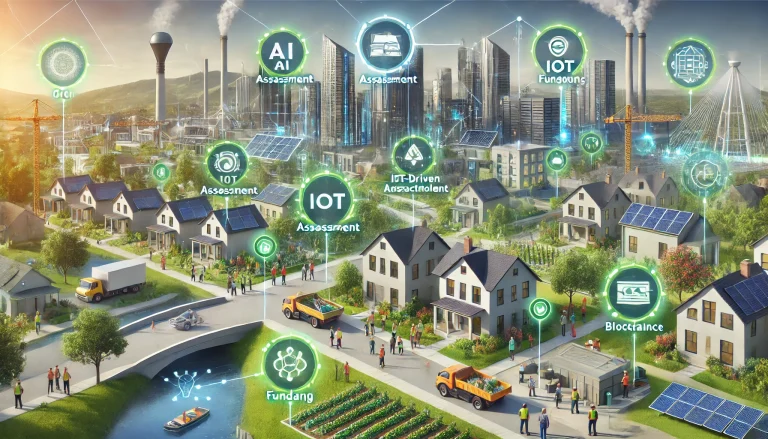Problem Statement
Consumer preferences in real estate are constantly evolving, driven by a variety of factors including technological advancements, lifestyle changes, and shifting economic conditions. Real estate companies must remain vigilant and adaptable, continuously monitoring these trends to offer properties and services that align with current market demands. Whether it’s the growing popularity of co-living spaces, the increasing demand for smart home technology, or the rising importance of sustainability, companies need to be agile in responding to these changes to maintain a competitive edge.
In recent years, several key trends have emerged that are reshaping the real estate landscape. The rise of remote work, for instance, has led to increased demand for homes with dedicated office spaces and high-quality internet connections. Additionally, urbanization and the desire for community living have driven the popularity of co-living spaces, particularly among younger generations seeking affordability and social interaction.
Technology is another major driver of change. Consumers are increasingly looking for properties equipped with smart home features, such as automated lighting, security systems, and energy management tools. These technologies not only enhance convenience and security but also appeal to eco-conscious buyers who are interested in reducing their environmental footprint.
Sustainability has become a significant factor in consumer decision-making. Buyers and renters are more frequently prioritizing properties that are energy-efficient, use sustainable materials, and have a reduced impact on the environment. Real estate companies must therefore invest in green building practices and offer sustainable living options to meet this growing demand.
Economic conditions also play a crucial role in shaping consumer preferences. Economic downturns, changes in interest rates, and shifts in housing affordability can all influence the types of properties that consumers seek. Real estate companies must be prepared to adjust their offerings and pricing strategies in response to these fluctuations.
To successfully navigate these evolving consumer preferences, real estate companies must adopt a proactive and flexible approach. This includes staying informed about emerging trends, investing in research and development, and fostering a culture of innovation that allows for the quick adaptation of new ideas and technologies.
Pain Points
- Keeping Up with Trends: Staying informed about rapidly changing consumer preferences and emerging trends in real estate.
- Technology Integration: Incorporating smart home technology and other innovations into properties to meet consumer demand.
- Sustainability Demands: Offering energy-efficient, sustainable properties that appeal to eco-conscious buyers and renters.
- Shifts in Lifestyle: Adapting to lifestyle changes, such as remote work, that influence property features and amenities.
- Economic Fluctuations: Adjusting offerings and pricing strategies in response to changing economic conditions and housing affordability.
- Urbanization and Co-Living: Meeting the demand for urban living and community-oriented spaces like co-living arrangements.
- Consumer Education: Educating consumers about new technologies, sustainable practices, and the benefits of innovative property features.
- Competition and Differentiation: Standing out in a competitive market by offering unique and desirable property features.
- Investment in Innovation: Allocating resources to research and development to stay ahead of industry trends and consumer expectations.
- Flexibility in Offerings: Maintaining the agility to quickly adapt to new consumer demands and market conditions.

Future Vision
Our platform envisions a future where real estate companies excel in adapting to evolving consumer preferences by staying ahead of trends, integrating technology and sustainability into their offerings, and responding swiftly to changes in the market. By adopting a proactive and flexible approach, companies can offer properties and services that not only meet current demands but also anticipate future needs.
A key focus will be on trend monitoring and analysis. The platform will support real estate companies in staying informed about emerging consumer preferences through advanced data analytics and market research tools. Companies will be encouraged to invest in research and development to explore new ideas and technologies that could shape the future of real estate.
Technology integration will also be a priority. The platform will guide companies in incorporating smart home features and other innovations into their properties. This includes offering automated lighting, security systems, energy management tools, and other smart technologies that enhance the living experience and appeal to tech-savvy consumers.
Sustainability will be at the forefront of the platform’s recommendations. Real estate companies will be encouraged to adopt green building practices and offer energy-efficient properties that cater to the growing demand for sustainable living options. This includes using sustainable materials, implementing energy-saving technologies, and designing properties that minimize environmental impact.
Flexibility in offerings will be another key consideration. The platform will support companies in maintaining the agility to quickly adapt to changes in consumer preferences and market conditions. This includes offering a diverse range of property types, from urban co-living spaces to suburban homes with dedicated office spaces, to meet the varied needs of different consumer segments.
Consumer education will also be a focus. The platform will provide tools and resources to help real estate companies educate buyers and renters about the benefits of new technologies, sustainable practices, and innovative property features. By informing consumers, companies can increase demand for their offerings and differentiate themselves in a competitive market.
By addressing these challenges and embracing a proactive, flexible approach, real estate companies can stay ahead of evolving consumer preferences and maintain a competitive edge in the industry. This approach will not only enhance customer satisfaction but also position companies as leaders in innovation and sustainability.
Use Cases
- Trend Monitoring and Analysis: Implementing advanced data analytics tools to stay informed about emerging consumer preferences and market trends.
- Smart Home Technology Integration: Offering properties equipped with smart home features, such as automated lighting, security systems, and energy management tools.
- Sustainable Property Development: Adopting green building practices and offering energy-efficient properties that cater to eco-conscious buyers and renters.
- Adaptation to Lifestyle Changes: Designing properties that accommodate new lifestyle trends, such as remote work, with features like dedicated office spaces.
- Flexible Offerings and Pricing: Maintaining the flexibility to quickly adapt offerings and pricing strategies in response to economic fluctuations and shifts in consumer demand.
- Urban Living and Co-Living Spaces: Developing properties that meet the demand for urban living and community-oriented spaces like co-living arrangements.
- Consumer Education Initiatives: Providing tools and resources to educate consumers about the benefits of innovative property features and sustainable living options.
- Competitive Differentiation: Offering unique and desirable property features that set the company apart in a competitive market.
- Investment in Research and Development: Allocating resources to explore new ideas, technologies, and trends that could shape the future of real estate.
- Agile Market Response: Maintaining the agility to quickly respond to changes in consumer preferences and market conditions, ensuring continued relevance and competitiveness.
Target Users and Stakeholders
- User: Real Estate Developers, Market Analysts, Corporate Strategy Officers, Innovation Teams, and Sales & Marketing Teams
- Age Group: 30-60 years
- Gender: M/F
- Usage Pattern: Regular usage for monitoring trends, integrating technology, developing sustainable properties, and adapting to changing consumer preferences in the real estate industry
- Benefit: Enhanced ability to stay ahead of consumer trends, offer desirable properties, and maintain a competitive edge in a dynamic market
- Stakeholders:
- Real Estate Companies: Firms that need to stay attuned to evolving consumer preferences and offer properties that meet current and future market demands.
- Consumers: Buyers and renters who seek properties that align with their lifestyle, technological preferences, and sustainability values.
- Technology Providers: Companies offering smart home technologies and innovations that can be integrated into real estate properties.
- Sustainability Advocates: Organizations and groups promoting energy efficiency, sustainable living, and environmentally friendly building practices.
- Investors: Individuals and institutions investing in real estate companies with a focus on innovation, sustainability, and market adaptability.
- Urban Planners: Professionals involved in the development of urban spaces that accommodate evolving consumer preferences and lifestyle changes.
Key Competition
- Zillow: Utilizes advanced data analytics to stay ahead of consumer trends and offers properties that align with current market demands.
- Redfin: Integrates smart home technologies into its listings and provides tools to help consumers understand the benefits of innovative property features.
- Lennar: Focuses on sustainable property development, offering energy-efficient homes with smart home features to appeal to eco-conscious buyers.
- KB Home: Adapts to lifestyle changes by designing properties with features that accommodate remote work, sustainability, and urban living.
- Toll Brothers: Maintains flexibility in its offerings, providing a diverse range of property types and pricing strategies to meet the varied needs of different consumer segments.
Products/Services
- Zillow Trend Monitoring Tools: Implementing advanced data analytics to stay informed about emerging consumer preferences and market trends.
- Redfin Smart Home Integration: Offering properties equipped with smart home features, such as automated lighting, security systems, and energy management tools.
- Lennar Sustainable Development: Adopting green building practices and offering energy-efficient properties that cater to eco-conscious buyers and renters.
- KB Home Lifestyle Adaptation: Designing properties that accommodate new lifestyle trends, such as remote work, with features like dedicated office spaces.
- Toll Brothers Flexible Offerings: Maintaining flexibility in offerings and pricing strategies to quickly adapt to changes in consumer preferences and market conditions.
Active Startups
- TrendTrack: Specializes in trend monitoring and analysis tools that help real estate companies stay ahead of evolving consumer preferences.
- SmartHomeCo: Focuses on integrating smart home technologies into real estate properties, enhancing the living experience for tech-savvy consumers.
- EcoBuild: Develops sustainable building materials and energy-efficient technologies for the real estate industry
- LiveWorkSpace: Offers design solutions that cater to the growing demand for remote workspaces in residential properties.
- UrbanCo: Specializes in developing co-living spaces and community-oriented urban properties.
- EduReal: Provides consumer education tools that help real estate companies inform buyers and renters about the benefits of innovative property features.
- FlexiHomes: Focuses on offering flexible property solutions that adapt to changing market conditions and consumer preferences.
- GreenLiving: Innovates in sustainable living solutions, offering properties with energy-efficient technologies and green building practices.
- R&DReal: Invests in research and development to explore new trends, technologies, and ideas that could shape the future of real estate.
- AgileProp: Provides tools and strategies for real estate companies to quickly respond to changes in consumer preferences and market conditions.
Ongoing Work in Related Areas
- Consumer Trend Research: Exploring new methods and tools for staying informed about emerging consumer preferences in the real estate market.
- Smart Home Technology Integration: Researching best practices for integrating smart home technologies into real estate properties.
- Sustainable Building Innovations: Developing new materials and technologies that promote sustainability and energy efficiency in real estate.
- Remote Work Adaptation: Designing properties that accommodate the growing demand for remote workspaces and flexible living arrangements.
- Urban Living and Co-Living Models: Innovating in the development of urban properties and co-living spaces that cater to changing consumer preferences.
- Consumer Education and Awareness: Creating tools and resources to educate consumers about the benefits of innovative property features and sustainable living options.
- Market Flexibility and Adaptation: Developing strategies for maintaining flexibility in real estate offerings and pricing in response to changing market conditions.
- Investment in R&D: Allocating resources to research and development to stay ahead of industry trends and consumer expectations.
- Competitive Differentiation Strategies: Exploring new approaches to stand out in a competitive market by offering unique and desirable property features.
- Agile Market Response Tools: Developing tools and methodologies for real estate companies to quickly respond to changes in consumer preferences and market conditions.
Recent Investment
- TrendTrack: $25M in Series A funding led by real estate tech investors, January 2021.
- SmartHomeCo: $20M in Series B funding from technology-focused venture capital firms, March 2020.
- EcoBuild: $18M in Seed funding from sustainable development investors, June 2021.
- LiveWorkSpace: $15M in Series A funding from real estate innovation investors, September 2020.
- UrbanCo: $12M in Seed funding from urban development and co-living space investors, December 2020.
Market Maturity
The market for adapting to evolving consumer preferences in real estate is rapidly maturing as companies recognize the importance of staying ahead of trends, integrating technology, and offering sustainable properties. Companies like Zillow, Redfin, and Lennar are leading the way with trend monitoring tools, smart home integration, and sustainable development practices. Startups such as TrendTrack, SmartHomeCo, and EcoBuild are driving innovation in trend analysis, smart home technologies, and sustainable building materials. Significant investments in consumer trend research, smart home technology integration, and sustainable building innovations are transforming the real estate industry, enabling companies to offer properties that meet current and future market demands. As the market continues to evolve, we expect to see more integrated and advanced solutions that enhance market adaptability and position real estate companies as leaders in innovation and sustainability.
Summary
Consumer preferences in real estate are constantly evolving, influenced by factors such as technology, lifestyle changes, and economic conditions. Real estate companies must stay attuned to these changes to offer properties and services that meet market demand. Whether it’s the rise of co-living spaces, the demand for smart home technology, or the desire for sustainability, companies must be agile in adapting to these trends. Our proposed platform leverages trend monitoring and analysis, smart home technology integration, sustainable property development, adaptation to lifestyle changes, flexible offerings and pricing, urban living and co-living spaces, consumer education initiatives, competitive differentiation, investment in research and development, and agile market response to address these challenges. Key pain points include keeping up with trends, technology integration, sustainability demands, shifts in lifestyle, economic fluctuations, urbanization and co-living, consumer education, competition and differentiation, investment in innovation, and flexibility in offerings.
Target users include real estate developers, market analysts, corporate strategy officers, innovation teams, and sales & marketing teams, with stakeholders encompassing real estate companies, consumers, technology providers, sustainability advocates, investors, and urban planners. Key competitors like Zillow, Redfin, Lennar, KB Home, and Toll Brothers offer various trend monitoring tools, smart home integration, sustainable development practices, lifestyle adaptation strategies, and flexible offerings, while startups such as TrendTrack, SmartHomeCo, and EcoBuild are driving innovation in trend analysis, smart home technologies, and sustainable building materials. Recent investments highlight significant interest and growth potential in platforms addressing the challenges of adapting to evolving consumer preferences in the real estate industry.
By addressing these challenges and adopting a proactive, flexible approach, real estate companies can stay ahead of evolving consumer preferences and maintain a competitive edge in the industry. This approach will not only enhance customer satisfaction but also position companies as leaders in innovation and sustainability.



